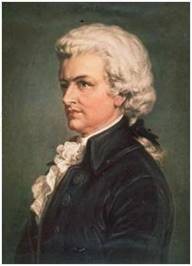W. A. Mozart (1756-1791)
VERSION FRANCAISE DISPONIBLE. VEUILLEZ CLIQUER SUR L'ICONE (BAS DE PAGE)
Wolfgang Amadeus Mozart (1756-1791) is considered the greatest musical genius of all time.
From a very young age, he became known throughout Europe. His numerous travels familiarized him with the various musical forms present at the time and allowed him to achieve the synthesis of French influences,
German and Italian. He excels in all genres: opera, symphonies, concertos…
Youth
Mozart was born on January 27, 1756. His father was a composer and violinist, choirmaster to the prince-archbishop of Salzburg.
Mozart was born on January 27, 1756. His father was a composer and violinist, choirmaster to the prince-archbishop of Salzburg.
He quickly revealed himself to be a child prodigy, playing the clavichord from the age of 4 and composing his first minuets at 5.
5 years her senior, was herself a young harpsichord prodigy.
This is how in 1762, when Mozart was 6 years old and his sister 11, their father Leopold decided to exploit their gifts and undertook to produce them in all the capitals of Europe.
It was during a trip to Italy in 1769 that Mozart wrote from memory, after two hearings,
the score of Allegri's famous Miserere, which the Vatican prohibited from copying. Far from blaming him, the Pope knighted him.
5 years her senior, was herself a young harpsichord prodigy.
This is how in 1762, when Mozart was 6 years old and his sister 11, their father Leopold decided to exploit their gifts and undertook to produce them in all the capitals of Europe.
It was during a trip to Italy in 1769 that Mozart wrote from memory, after two hearings,
the score of Allegri's famous Miserere, which the Vatican prohibited from copying. Far from blaming him, the Pope knighted him.
Maturity
In 1781 he left Salzburg and settled in Vienna as an independent musician. It was there that in 1782 he married Constance Weber.
In Vienna, he became friends with Joseph Haydn, who reciprocated Mozart's admiration for him by saying one day to Leopold: “Before God and as an honest man,
your son is the greatest composer I know either personally or by reputation.”
In 1786, Mozart met Lorenzo da Ponte, poet, librettist and adventurer. It was the beginning of a collaboration lasting several years which saw the birth of three immortal operas: “The Marriage of Figaro” (in 1786),
“Don Giovanni” (in 1787) and “Cosi fan tutte” (in 1790).
It was during the last 6 years of his life, from 1785 to 1791, that Mozart produced his most beautiful masterpieces, in addition to the operas mentioned above:
- Symphonies n°38, 39, 40 and 41.
- The Clarinet Concerto
- Piano concertos nos. 20 to 27
-
Operas: The Clemency of Titus, The Magic Flute
- In sacred music: Ave Verum Corpus, the Requiem that he did not have time to finish. (It was his student Süssmayer who finished it after his death).
In 1781 he left Salzburg and settled in Vienna as an independent musician. It was there that in 1782 he married Constance Weber.
In Vienna, he became friends with Joseph Haydn, who reciprocated Mozart's admiration for him by saying one day to Leopold: “Before God and as an honest man,
your son is the greatest composer I know either personally or by reputation.”
In 1786, Mozart met Lorenzo da Ponte, poet, librettist and adventurer. It was the beginning of a collaboration lasting several years which saw the birth of three immortal operas: “The Marriage of Figaro” (in 1786),
“Don Giovanni” (in 1787) and “Cosi fan tutte” (in 1790).
It was during the last 6 years of his life, from 1785 to 1791, that Mozart produced his most beautiful masterpieces, in addition to the operas mentioned above:
- Symphonies n°38, 39, 40 and 41.
- The Clarinet Concerto
- Piano concertos nos. 20 to 27
-
Operas: The Clemency of Titus, The Magic Flute
- In sacred music: Ave Verum Corpus, the Requiem that he did not have time to finish. (It was his student Süssmayer who finished it after his death).




